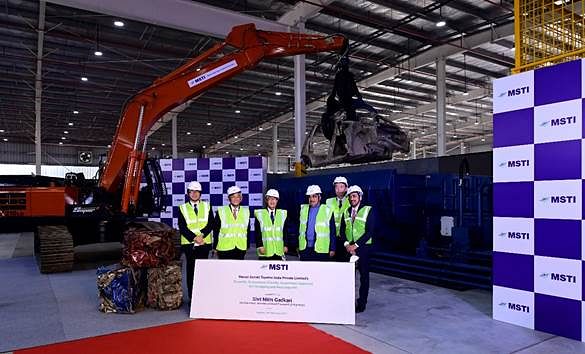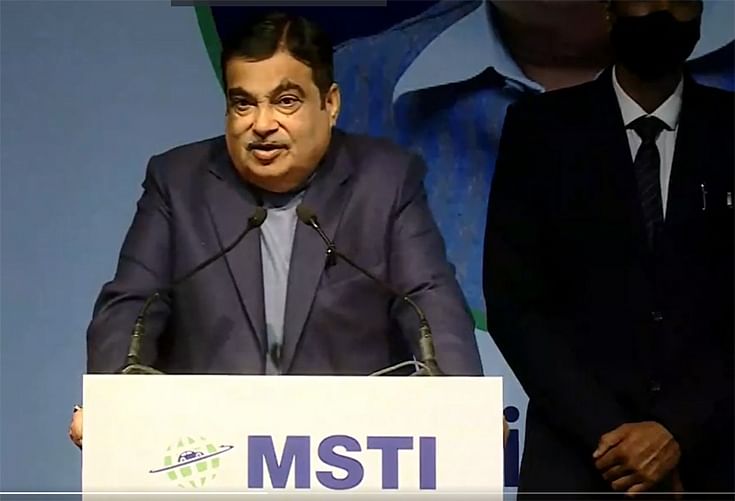Maruti Suzuki Toyotsu India can scrap a car in 200 minutes
The Noida facility has a scrappage capacity of 2,000 end-of-life vehicles a month or 24,000 units annually.
Two years after Maruti Suzuki and Toyota Tsusho Group announced their vehicle dismantling and recycling joint venture – Maruti Suzuki Toyotsu India (MSTI) – the JV has commenced operations. The first unit from the JV between Maruti Suzuki India and Toyota Tsusho Group (Toyota Tsusho Corp (TTC) and Toyota Tsusho India) with each owning 50% equity, was inaugurated today by Transport Minister Nitin Gadkari.
The vehicle dismantling and recycling unit located in Noida, Uttar Pradesh has been set up with an investment of Rs 44 crore and is spread over 10,993 square metres. It has a scrapping capacity of 2,000 units a month or 24,000 units annually. Processing time or scrappage time for a single car is 200 minutes. This first plant will be followed by others as per demand from other States in India.

L-R: Masaru Akaishi, MD, MSTI; Kenichi Ayukawa, MD & CEO, Maruti Suzuki India; Satoshi Suzuki, Ambassador Extraordinary and Plenipotentiary, Embassy of Japan; Union Minister of Road Transport & Highways, Nitin Gadkari; Hiroshi Yanagisawa, MD, Toyota Tsusho India and Rahul Bharti, Executive Director, Corporate Affairs, Maruti Suzuki India.
According to the company, all machines installed at MSTI are manufactured in India. The company follows global best practices to ensure safe, environmental-friendly scrapping and recycling of ELVs (end-of-life vehicles), zero discharge of oils / AC gases to land and air, scanning of radioactive material, up to 95% scrap recovery, and offers special care for human safety. The scrap recoverd is sold to authorised recyclers and smelters.
MSTI will be responsible to procure and dismantle End-of-Life Vehicles (ELVs). The process will include complete solid and liquid waste management as per the Indian laws and globally approved quality and environment standards.
According to MSTI, customers will be able to dispose ELVs through authorised dismantlers and get a certificate of destruction to be used for deregistration at RTOs. The procedure is transpatent and payment is digital.

Nitin Gadkari: "We expect 10 to 12% more sales due to scrappage policy."
In his inaugural speech, Nitin Gadkari said: “Today I got an opportunity to see the actual functioning of a scrappage unit. The Indian automobile sector is a very important one in India. This sector gives maximum employment potential and also gives maximum revenue to the state and Central governments. All the prestigious brands of the world are present in India. Ecology and the environment is very important because the old vehicle crate a lot of p and we are all facing health problems because of air pollution, particularly Delhi. This is one of the important solutions where we can reduce pollution. But at the same time, it is also equally important for the economy. I am confident that with this scrappage policy our automobile industry will be more competitive in the international market. With scrappage, we will get a lot of raw materials.:
He added, "At present, our automobile industry turnover is Rs 7.5 lakh crore, of which Rs 3 lakh crore is exports. My aim is to make the Indian auto industry to the volume of Rs 15 lakh crore within five years. For this reason, we are encouraging flex fuel engines, ethanol, electric, CNG, LNG and green hydrogen. I am very happy that people in India are doing excellent research. Particularly in battery chemistry, we have lot of innovation in sodium ion, alumnium ion by which in due course of time we will be more competent.”
He added, “I am confident the scrappage policy will help reduce pollution. We are giving a lot of benefits to manufacturers and also support to consumers for scrapping old vehicles. The scrappage policy will boost automobile sales. We expect there will be 10 to 12% more sales because of the scrappage policy and that is a win-win situation for all stakeholders. This will create more jobs – at least 200,000 jobs directly and indirectly. Also, availability of low cost raw material like steel, copper, aluminium, rubber and plastic will increase and in turn reduce import cost. There is potential to reduce raw material cost by 33%, generate incremental GST revenue on vehicle sales (approximately Rs 30,000 to Rs 40,000) for the government. We are expecting fresh investment worth over Rs 10,000 crore in automotive scrappage and fitness centres. Our aim is to have at least 3 to 4 scrappage centres in every district."
Photos: Dhruv Attri
RELATED ARTICLES
Cosmo First diversifies into paint protection film and ceramic coatings
The Aurangabad, Maharashtra-based packaging materials supplier is leveraging its competencies in plastic films and speci...
JSW MG Motor India confident of selling 1,000 M9 electric MPVs in first year
The 5.2-metre-long, seven-seater luxury electric MPV, which will be locally assembled at the Halol plant in Gujarat, wil...
Modern Automotives targets 25% CAGR in forged components by FY2031, diversifies into e-3Ws
The Tier-1 component supplier of forged components such as connecting rods, crankshafts, tie-rods, and fork bridges to l...






 23 Nov 2021
23 Nov 2021
 17010 Views
17010 Views
















 Autocar Professional Bureau
Autocar Professional Bureau




